Table of Contents
Imagine a world where preparing a meal isn't a daunting task but a source of accomplishment and independence. That's the power of life skills cooking, especially when integrated with Occupational Therapy (OT). Cooking, a fundamental life skill, extends beyond just following recipes; it's about fostering independence and enhancing overall well-being. For individuals facing physical, cognitive, or developmental challenges, simple meal prep ideas occupational therapy offers a pathway to improved motor skills, cognitive function, and sensory integration. This article will explore the multifaceted benefits of incorporating cooking into OT, providing practical examples of activities, effective teaching strategies, and ways to address common challenges. Whether you're an OT practitioner, caregiver, or individual seeking to enhance your cooking skills, prepare to discover how simple meal prep can be a powerful tool for growth and independence. We'll guide you through basic and advanced meal prep techniques, offering age-appropriate checklists and solutions to common cooking hurdles. Let's turn the kitchen into a therapeutic space, one delicious and skill-building meal at a time.
Benefits of Simple Meal Prep in Occupational Therapy
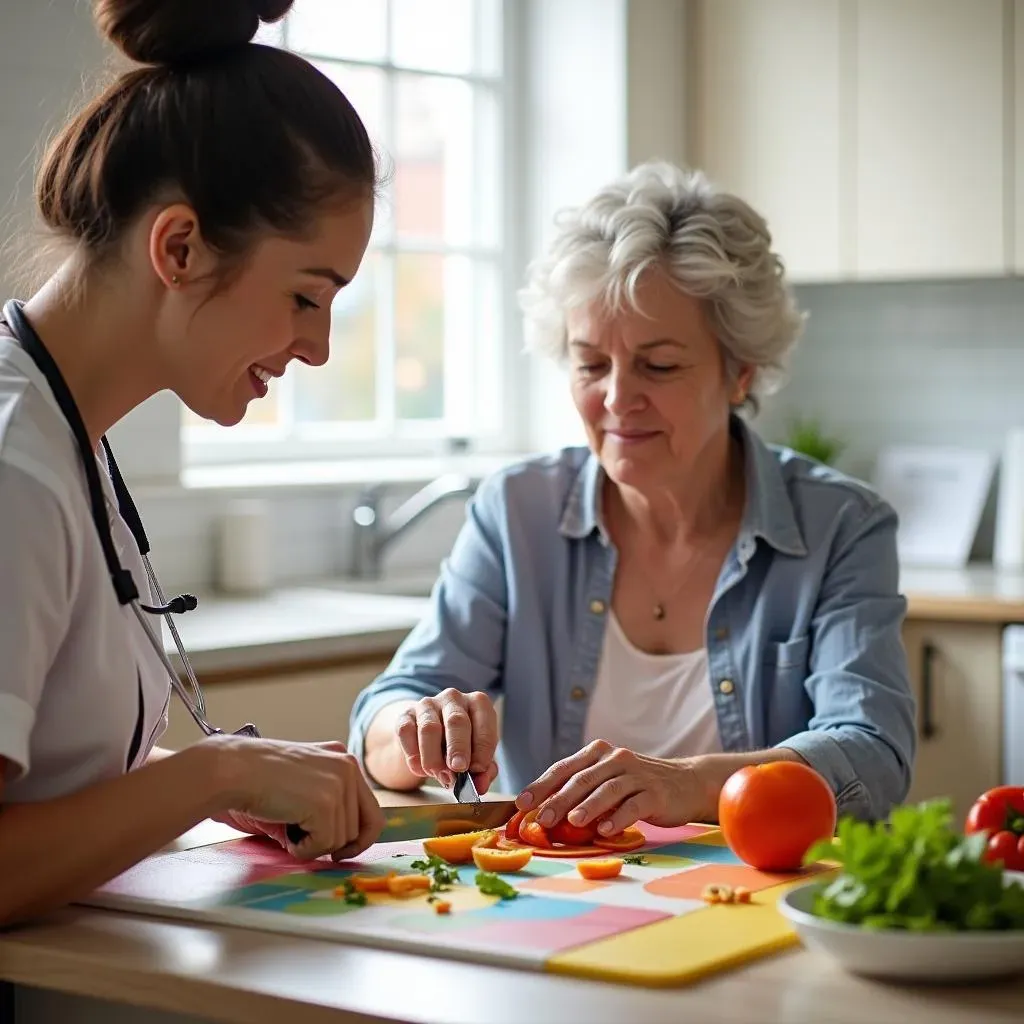
Benefits of Simple Meal Prep in Occupational Therapy
Enhancing Physical and Cognitive Skills
Simple meal prep is more than just cooking; it's a therapeutic activity that targets a wide range of skills. Think about it: chopping vegetables refines fine motor coordination, while reaching for ingredients improves gross motor skills. Following a recipe enhances reading comprehension and sequencing abilities. Even something as simple as setting the table works on spatial awareness and organization. For individuals recovering from injuries or managing chronic conditions, these activities can significantly improve their functional independence and quality of life.
Moreover, meal preparation provides a fantastic platform for cognitive rehabilitation. Planning a meal involves executive functions like problem-solving (what to substitute if you're missing an ingredient?), decision-making (what to cook based on available resources?), and time management (how long will each step take?). This is particularly beneficial for individuals with cognitive impairments, helping them regain or maintain essential cognitive abilities in a practical and engaging way.
Promoting Independence and Sensory Exploration
One of the most significant benefits of simple meal prep is the sense of independence it fosters. Being able to prepare a meal, even a simple one, can dramatically boost self-esteem and confidence. It empowers individuals to take control of their nutrition and dietary needs, reducing reliance on others and promoting a sense of autonomy. This is especially crucial for those transitioning to independent living or seeking to maintain their independence as they age.
Furthermore, cooking offers a rich sensory experience. The vibrant colors of fresh produce, the varied textures of different foods, and the enticing aromas of spices can stimulate the senses and make mealtime more enjoyable. For picky eaters or individuals with sensory sensitivities, involving them in the cooking process can encourage them to explore new foods and develop a more positive relationship with eating. It's a fun and creative way to address sensory processing needs while building essential life skills.
Basic Simple Meal Prep Ideas for Occupational Therapy Sessions
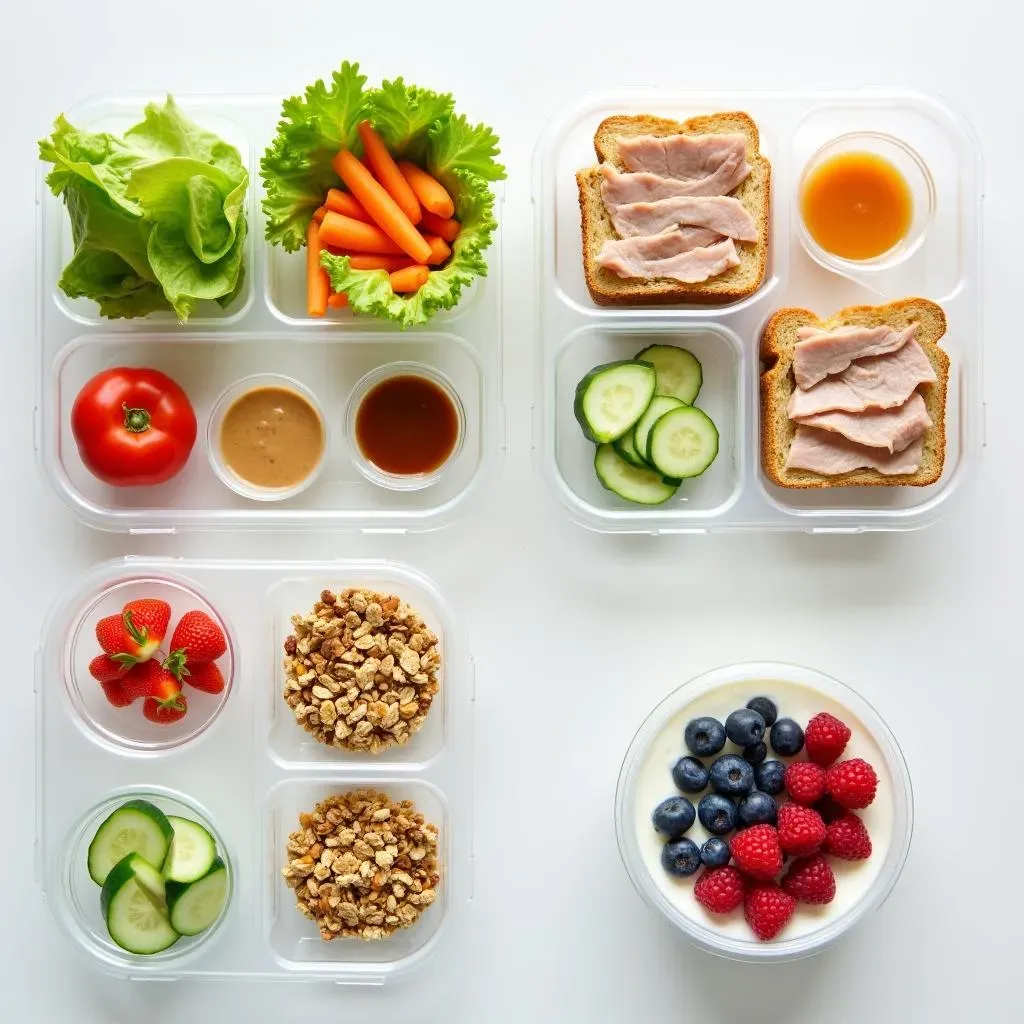
Basic Simple Meal Prep Ideas for Occupational Therapy Sessions
Alright, let's dive into some super accessible meal prep ideas that are perfect for OT sessions. We're talking about recipes so simple, they're practically foolproof. Think about it: these aren't just about making food; they're about building skills, confidence, and independence. When selecting basic simple meal prep ideas for occupational therapy sessions, we want to focus on tasks that break down easily, require minimal equipment, and provide ample opportunities for skill-building. These starter recipes are awesome for addressing a variety of therapeutic goals, from fine motor skills to cognitive sequencing. Each one can be modified to meet the specific needs and abilities of the individual.
- Sandwich Assembly: This classic task involves spreading, layering, and cutting – all great for fine motor practice.
- Salad Creation: Tearing lettuce, chopping veggies (with supervision), and mixing dressing offer sensory exploration and motor skill development.
- Yogurt Parfaits: Layering yogurt, granola, and fruit is simple, visually appealing, and encourages healthy eating habits.
Beyond the Basics: Expanding Meal Prep Skills in OT
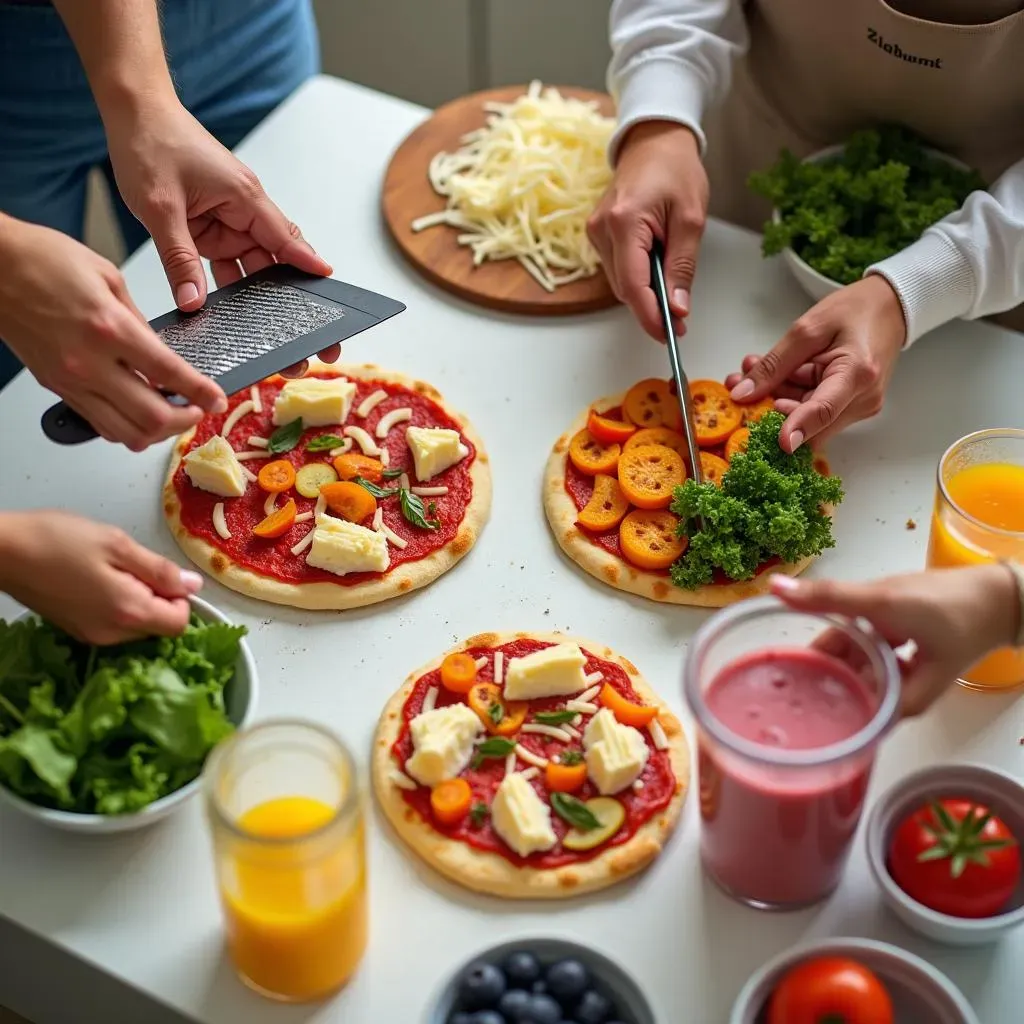
Beyond the Basics: Expanding Meal Prep Skills in OT
Stepping Up the Complexity
so we've nailed the basics. Now, let's crank things up a notch! "Beyond the Basics: Expanding Meal Prep Skills in OT" means introducing more complex recipes and techniques that challenge individuals further. Think about moving from simple sandwich assembly to making a quesadilla with multiple fillings, or from a basic salad to a more elaborate one with homemade vinaigrette. These activities require greater dexterity, cognitive planning, and problem-solving skills. It's all about progressively increasing the demands to foster continuous growth and development.
We're not just talking about harder recipes, though. It's also about introducing more tools and equipment. Maybe it's learning to safely use a vegetable peeler, a can opener, or even a simple blender. Each new tool presents an opportunity to work on specific motor skills and increase familiarity with kitchen safety. Plus, it makes the whole process more engaging and interesting!
Meal Prep Ideas for Skill Enhancement
So, what kind of meal prep ideas are we talking about here? Well, let's get creative! How about mini pizzas on English muffins? This involves spreading sauce, grating cheese, and arranging toppings – a fantastic way to work on fine motor skills and hand-eye coordination. Or maybe a simple stir-fry with pre-cut vegetables and a pre-made sauce? This introduces the concept of cooking with heat and requires following a multi-step process.
Another great option is making smoothies. This is a fun and customizable activity that allows for sensory exploration and encourages healthy eating habits. Individuals can choose their favorite fruits and vegetables, measure ingredients, and operate a blender (with appropriate supervision, of course). Plus, it's a delicious and refreshing reward for their hard work!
Here are some ideas:
- Quesadillas: Fine motor skills (spreading, grating), sequencing, and heat safety.
- Stir-Fries: Chopping (with adaptive tools if needed), following multi-step directions, and using a stovetop safely.
- Smoothies: Measuring, pouring, operating a blender, and sensory exploration of flavors.
Adapting for Individual Needs
The key to success with "Beyond the Basics" is adaptation. Not every recipe or technique will be suitable for every individual. It's crucial to carefully assess their current skill level, strengths, and challenges, and then modify the activity accordingly. This might involve breaking down the task into smaller steps, providing visual aids or verbal prompts, or using adaptive equipment to compensate for physical limitations.
For example, if someone has difficulty with grip strength, you could use adaptive cutting boards or utensils with built-up handles. If they struggle with sequencing, you could provide a checklist or visual schedule to help them stay on track. And if they're easily overwhelmed by complex instructions, you could simplify the recipe and focus on just one or two key steps. The goal is to create a challenging but achievable experience that promotes growth and builds confidence.
Challenge | Possible Adaptation |
|---|---|
Weak Grip | Adaptive utensils, built-up handles |
Sequencing Difficulties | Visual checklists, step-by-step instructions |
Overwhelmed by Complexity | Simplified recipes, focus on key steps |
Teaching Strategies for Simple Meal Prep in Occupational Therapy
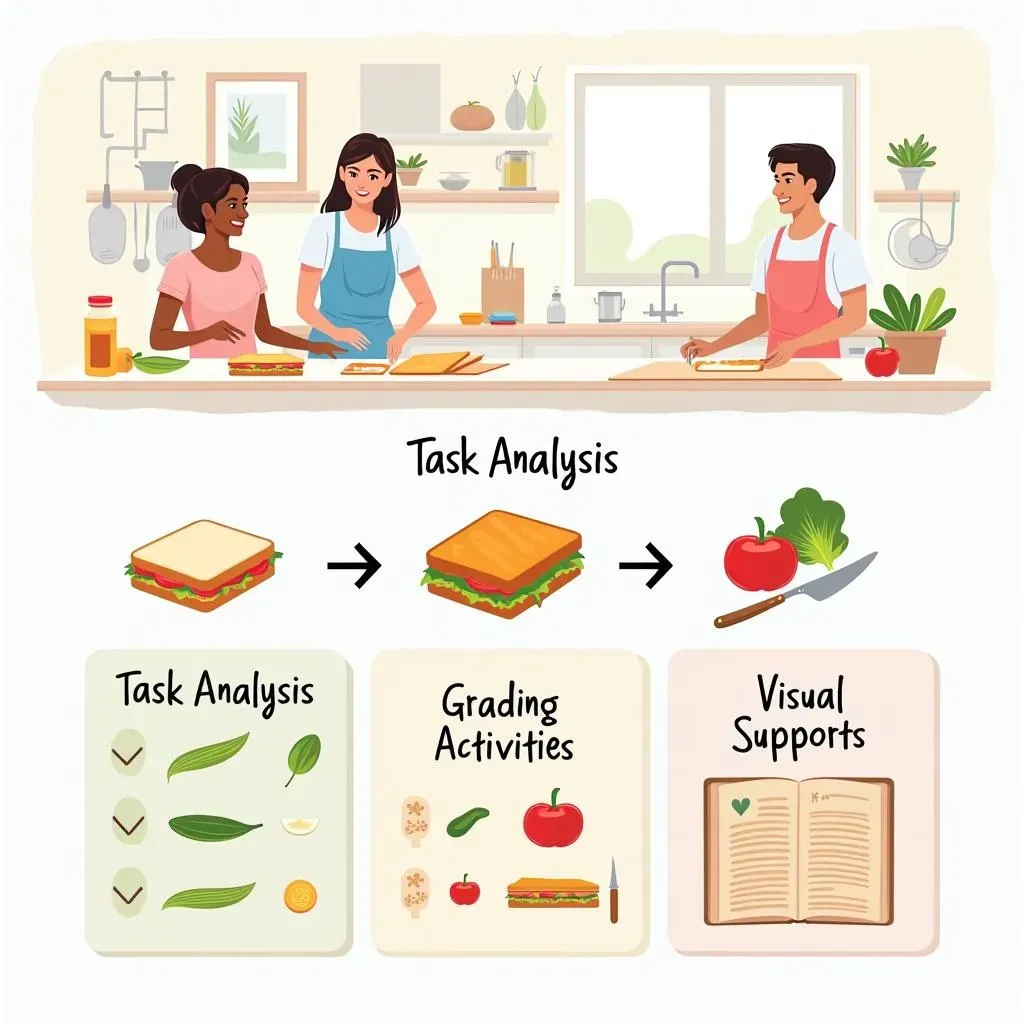
Teaching Strategies for Simple Meal Prep in Occupational Therapy
so you're diving into teaching simple meal prep in occupational therapy? Awesome! Let's break down some key teaching strategies that can make all the difference. First off, remember that everyone learns at their own pace. What's simple for one person might be overwhelming for another. So, the golden rule is to start where the individual is at and gradually increase the complexity as they gain confidence and skills. Think of it like building a tower – you need a solid foundation before you can add more blocks.
One of the most effective teaching strategies is task analysis. This involves breaking down each meal prep activity into smaller, more manageable steps. For example, if you're teaching someone how to make a sandwich, you might break it down into these steps: gather ingredients, spread condiments, add fillings, close the sandwich, and cut it in half. By breaking down the task, you can identify specific areas where the individual might need extra support or practice. Plus, it makes the whole process less daunting and more achievable.
Teaching Strategy | Description | Example |
|---|---|---|
Task Analysis | Breaking down complex tasks into smaller, manageable steps. | Making a sandwich: Gather ingredients, spread condiments, add fillings, close the sandwich, cut in half. |
Grading Activities | Adjusting the difficulty of a task to match the individual's skill level. | Starting with pre-cut vegetables and gradually introducing knife skills. |
Visual Supports | Using visual aids to support understanding and memory. | Using picture recipes or checklists to guide the individual through the steps. |
Addressing Challenges in Simple Meal Prep: An Occupational Therapy Perspective
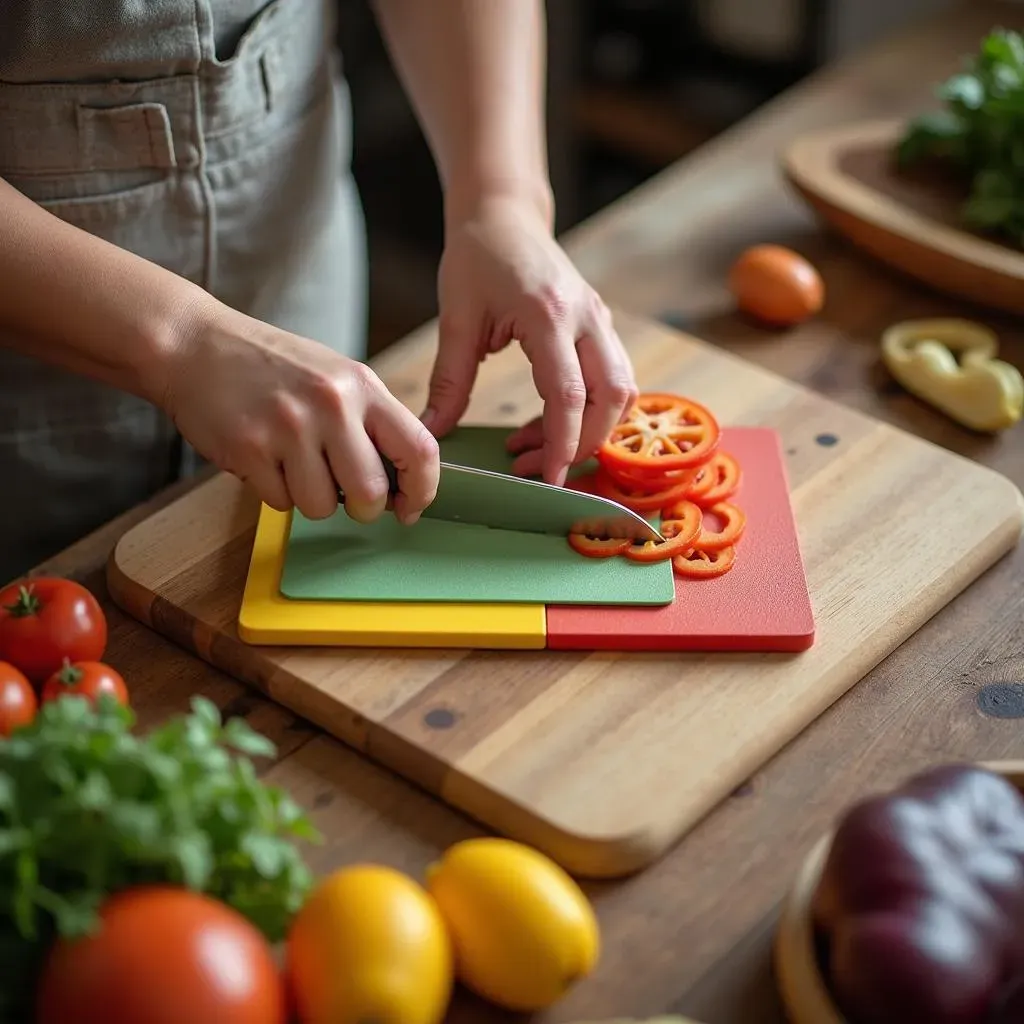
Addressing Challenges in Simple Meal Prep: An Occupational Therapy Perspective
Common Pitfalls and Solutions
Let's face it, even with the best-laid plans, challenges are bound to pop up when you're working on simple meal prep. Maybe someone accidentally adds salt instead of sugar (we've all been there!), or perhaps they get frustrated when they can't quite peel a carrot. It's all part of the learning process! The key is to anticipate these challenges and have strategies in place to address them calmly and effectively. Remember, the goal is not just to make a meal, but to build skills and confidence. Addressing challenges in simple meal prep: an occupational therapy perspective requires patience, creativity, and a willingness to adapt.
One of the most common challenges is difficulty following multi-step instructions. This is where visual supports, like picture recipes or checklists, can be incredibly helpful. Another frequent issue is frustration with fine motor tasks, such as chopping or peeling. In these cases, adaptive equipment, like adapted knives or vegetable peelers, can make a huge difference. And, of course, safety is always a concern when working in the kitchen. Make sure to provide clear instructions on how to use kitchen tools safely, and always supervise individuals who are using sharp objects or working near heat.
Challenge | Possible Solution |
|---|---|
Difficulty Following Instructions | Visual recipes, checklists, simplified steps |
Fine Motor Difficulties | Adaptive equipment, pre-cut ingredients, hand-over-hand assistance |
Safety Concerns | Clear instructions, supervision, safety tools (e.g., oven mitts) |
Turning Mistakes into Learning Opportunities
So, what happens when things go wrong? Do you throw in the towel and order a pizza? Absolutely not! Instead, view mistakes as valuable learning opportunities. If someone adds too much salt, talk about how to balance the flavors by adding a little bit of sugar or lemon juice. If they burn something on the stovetop, discuss the importance of paying attention to cooking times and temperatures. The goal is to help individuals understand what went wrong and how to prevent it from happening again.
It's also important to create a supportive and non-judgmental environment. Let individuals know that it's okay to make mistakes and that you're there to help them learn and grow. Encourage them to try new things and to not be afraid of failure. The more they practice and experiment, the more confident and skilled they will become. And who knows, they might even discover a new favorite recipe or technique along the way!
Conclusion: Empowering Independence Through Simple Meal Prep
Incorporating simple meal prep ideas into occupational therapy is more than just teaching someone to cook; it's about fostering independence, building confidence, and enhancing overall quality of life. By understanding the developmental benefits, implementing effective teaching strategies, and addressing potential challenges, we can empower individuals of all ages and abilities to navigate the kitchen with competence and joy. From basic tasks to more complex recipes, the journey of learning to cook is a journey of self-discovery and empowerment. So, let's continue to champion the power of cooking as a therapeutic tool, unlocking new possibilities and creating a world where everyone can experience the satisfaction of preparing their own meals.